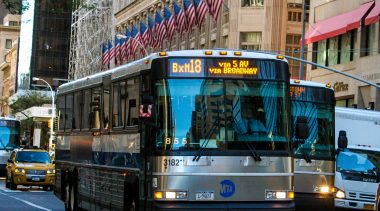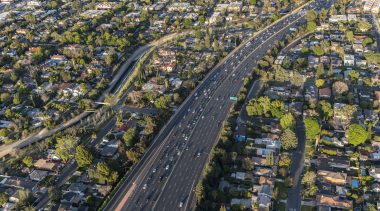Baruch Feigenbaum is senior managing director of transportation policy at Reason Foundation.
Feigenbaum has a diverse background researching and implementing transportation issues including revenue and finance, public-private partnerships, highways, transit, high-speed rail, ports, intelligent transportation systems, land use, and local policymaking. Prior to joining Reason, Feigenbaum handled transportation issues on Capitol Hill for Rep. Lynn Westmoreland.
Feigenbaum is a member of the Transportation Research Board Bus Transit Systems and Intelligent Transportation Systems Committees. He is vice president of programming for the Transportation and Research Forum Washington Chapter, a reviewer for the Journal of the American Planning Association (JAPA), and a contributor to Planetizen. He has appeared on NBC Nightly News and CNBC. His work has been featured in the Washington Post, The Wall Street Journal and numerous other publications.
Feigenbaum earned his master's degree in Transportation Planning with a focus in engineering from the Georgia Institute of Technology.
-
Using Managed Lanes in Metro Areas to Fund the Reconstruction of Interstate Highways
Value-added tolling is the most realistic way to pay for the needed rebuilding of Interstate highways.
-
Using Tolling and Public-Private Partnerships to Finance Louisiana’s Roadways
Tolling is the most ideal user fee because there is a direct link between the toll and the specific road infrastructure used.
-
The Proposed Texas High-Speed Rail Project Requires Caution
There is a probability that if this project is built and put into operation, Texas Central will default on its loans, require a taxpayer bailout, or both.
-
Study Claims, Without Showing Data, Michigan Spent $90 Million More By Using Road Work Contractors
The study's flawed methodology, lack of transparency and available data raise serious questions about its cost comparison claims.
-
The Orange County Transportation Authority’s Long-Range Plan Is Better Than Most
OCTA has done far better than many of its Southern California neighbors in developing a long-range plan that actually addresses many of its key infrastructure issues.
-
Gov. Newsom Scales Back California High-Speed Rail Project
The decision is a victory for fiscal responsibility and commonsense transportation policy.
-
Frequently Asked Questions About Managed Lanes
Managed lanes can provide motorists with a reliable means of completing their commutes and reduce funding uncertainties that plague many infrastructure systems.
-
Renewing the National Commitment to the Interstate Highway System: A Foundation for the Future
The report makes several good recommendations but falls short of truly providing a realistic, financially sustainable path forward for Interstates.
-
The Flaws In a Study Linking Ridesharing and Traffic Fatalities
The report should address questions about vehicle-miles traveled as well as urban and rural fatality rates.
-
Cars, Mass Transit and the Efforts to Reduce Emissions
Investments in mass transit ought to be more selective and focused on expanding and maintaining ridership in areas with high rates of transit ridership by operating more heavily during times of greater demand.
-
Jitneys Could Help Provide a Critical Mass Transit Options in Miami
The city has a successful low-cost private jitney industry frequented by immigrants and minorities that could help increase transit ridership rates at a minimal cost to taxpayers.
-
Technology Is Revolutionizing Transportation and Microtransit
Microtransit is a relatively recent phenomenon that allows customers to reserve trips online or through a mobile interface and uses software algorithms to map out dynamic service routes.
-
Annual Privatization Report 2018 — Surface Transportation
An analysis of worldwide developments in surface transportation public-private partnerships.
-
Mileage-Based User Fees Are a Promising Successor to the Gas Tax
The United States needs a new funding policy to fund its surface transportation network.
-
It Will Hurt, but it is Time for California to Walk Away from High-Speed Rail Fiasco
Reality has failed to live up to the state’s promises.
-
How Georgia Is Creating the Foundation For a Successful Regional Transportation System
Georgia faces the prospect of millions of new residents by 2040 and needs a comprehensive infrastructure plan.
-
Self-Driving Cars Can Deliver Huge Safety Gains If We Resist the Urge to Overregulate Them
While Florida has avoided some of the onerous regulations found in California and Nevada, its current legislation is far from perfect for automated-vehicle testing.
-
California’s Prop. 69 Puts Focus on How State Spends Transportation Funds
Money raised for roads and highways should be used to maintain and upgrade roads and highways.


















